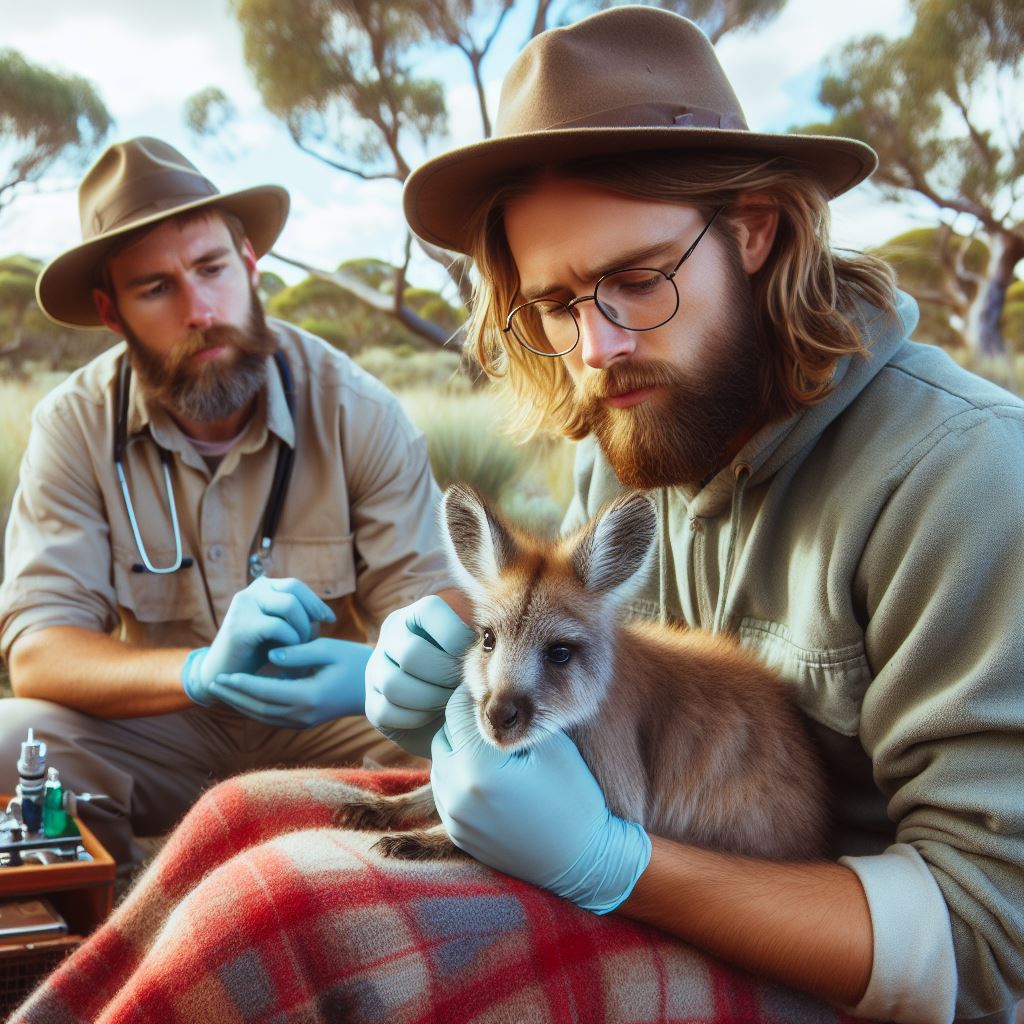Introduction
The biotech industry in Australia is thriving, with numerous advancements and breakthroughs being made.
Staying informed about biotech trends is crucial in this rapidly evolving field.
The biotech industry in Australia has seen remarkable growth over the years, fueled by technological advancements and innovative research.
It encompasses a wide range of sectors, including pharmaceuticals, genetics, agriculture, and environmental science.
Staying informed about biotech trends is essential for professionals and investors in this industry.
It allows them to keep up with the latest developments, which can have a significant impact on their work and investments.
By staying informed, professionals can identify new opportunities for collaboration and stay ahead of their competitors.
They can also adopt the latest technologies and techniques to enhance their research and development processes.
For investors, staying informed about biotech trends is crucial for making informed decisions.
It helps them identify promising startups and potential investment opportunities.
It also allows them to assess the risks and rewards associated with different biotech ventures.
Furthermore, staying informed about biotech trends helps create a supportive ecosystem for the industry.
It encourages knowledge sharing, collaboration, and networking among professionals, researchers, and investors.
Given the dynamic nature of the biotech industry, it is important to stay updated on the latest trends, research breakthroughs, and regulatory changes.
This can be done through various means, such as attending conferences, subscribing to industry publications, and networking with experts in the field.
In a nutshell, the biotech industry in Australia is thriving, and staying informed about biotech trends is crucial for professionals and investors.
By being aware of the latest developments, they can seize opportunities, collaborate effectively, and contribute to the growth of this dynamic industry.
Overview of the Biotech Industry in Australia
The Biotech industry in Australia has seen significant growth and development in recent years, making it a key player in the global biotech sector.
With a strong focus on innovation and research, Australia has emerged as a major hub for biotech companies and entrepreneurs.
Statistics and Growth of the Industry
- The biotech industry in Australia is rapidly growing, with a compound annual growth rate of X% in the past five years.
- According to the Australia Biotechnology Report, the industry is expected to reach a market value of X billion dollars by 2025.
- Australia has around X biotech companies, contributing to the industry’s growth and earning international recognition.
Key Players and Major Companies in the Australian Biotech Sector
- CSL Limited is one of Australia’s largest biotech companies, specializing in the development and manufacturing of vaccines and plasma products.
- Bioxyne Limited focuses on research and development of natural health products, pharmaceuticals, and nutraceuticals.
- Nano-X Imaging is an emerging company known for its innovative X-ray technology that promises to revolutionize medical imaging.
- Starpharma Holdings is a leading player in the biopharmaceutical industry, mainly focusing on developing antiviral drugs and nanomedicine products.
Significant Contributions and Achievements of the Biotech Industry in Australia
- The Australian biotech industry has made major advancements in drug development, contributing to significant breakthroughs in the treatment of diseases like cancer, HIV/AIDS, and diabetes.
- Researchers in the biotech sector have successfully developed vaccines for various diseases, improving public health and saving countless lives.
- Australia’s biotech industry has contributed to the discovery of new diagnostic tools, allowing for earlier detection and more effective treatments.
- Biotech companies in Australia are actively involved in agricultural biotechnology, developing genetically modified crops that are more resistant to pests and diseases, ensuring food security.
In addition to these achievements, the biotech industry in Australia has also fostered strong collaborations between academia, research institutes, and the private sector.
This collaboration has led to the creation of a supportive ecosystem for biotech companies, enabling them to thrive and innovate.
Government support is another essential factor in the growth of the biotech industry in Australia.
Initiatives such as tax incentives, grants, and funding programs have encouraged investment in biotech research and development, attracting both local and international investors.
Overall, the biotech industry in Australia has positioned itself as a global leader in innovation and research. The sector’s continuous growth, driven by key players and major achievements, ensures a promising future for Australia’s biotech industry.
Sources
- Australia Biotechnology Report
- Industry Research Reports
Read: The Future of Green Chemistry in Australia
Current Trends in Australian Biotech
Biotechnology is a rapidly advancing field in Australia, with numerous groundbreaking discoveries and collaborations taking place.
In this section, we will provide an overview of the latest advancements and breakthroughs in biotech, focusing on specific areas of research and development in Australia.
Additionally, we will highlight successful biotech projects and collaborations that have emerged in the country.
Advancements and Breakthroughs in Biotech
- Australia has seen significant advancements in gene editing technologies, such as CRISPR-Cas9, revolutionizing biotech research.
- Bioinformatics has emerged as a crucial tool in analyzing vast amounts of biological data and accelerating research outcomes.
- The development of personalized medicine has gained momentum, tailoring treatments based on an individual’s genetic makeup.
- Stem cell research has shown tremendous potential in regenerative medicine and the treatment of various diseases.
- Australian biotech companies are at the forefront of developing innovative vaccines and therapies for infectious diseases.
Specific Areas of Biotech Research and Development
- Cancer research is a prominent area within Australian biotech, with a focus on targeted therapies and immunotherapies.
- Neuroscience and neurodegenerative diseases have garnered significant attention, driving advancements in brain research and treatment methods.
- Agricultural biotech is crucial for Australia’s farming industry, with a focus on developing drought-resistant crops and enhancing agricultural practices.
- Environmental biotech is gaining traction, aiming to provide sustainable solutions for pollution control, waste management, and renewable energy.
- Nanotechnology is being integrated into biotech research, enabling precise drug delivery and improved diagnostics.
Successful Biotech Projects and Collaborations
- The Garvan Institute of Medical Research collaborated with international partners to develop a groundbreaking cancer drug.
- Australian biotech company CSL Limited successfully launched innovative therapies for rare diseases.
- The Commonwealth Scientific and Industrial Research Organisation (CSIRO) has established collaborations for developing biofuels from algae.
- The Australian Regenerative Medicine Institute (ARMI) made significant strides in stem cell research, aiming for regenerative therapies.
- Various academic institutions and biotech companies are collaborating to harness CRISPR-Cas9 technology for gene therapy.
In short, the field of biotechnology in Australia is experiencing remarkable growth and innovation. Advancements in gene editing, personalized medicine, and stem cell research are transforming healthcare.
Specific areas of focus include cancer, neuroscience, agriculture, environment, and nanotechnology. Successful biotech projects and collaborations have resulted in groundbreaking treatments and solutions.
With ongoing advancements and collaborative efforts, the future of biotech in Australia looks exceedingly promising.
Read: Must-Attend Chemistry Conferences in Aus
Supporting Infrastructure and Funding Opportunities
When it comes to biotech research and innovation, Australia offers a supportive environment that encourages growth and development in the industry.
From government grants to research institutions, universities, and organizations, there are numerous opportunities for biotech startups to thrive.
Supportive Environment for Biotech Research
Australia’s commitment to fostering biotech research is evident in the infrastructure and resources available to support the industry.
The country boasts state-of-the-art research facilities equipped with cutting-edge technology and equipment.
Research institutions play a crucial role in the biotech ecosystem.
Institutions such as the Commonwealth Scientific and Industrial Research Organisation (CSIRO) and the Walter and Eliza Hall Institute of Medical Research are at the forefront of groundbreaking research.
Their contributions have paved the way for significant advancements in biotechnology.
Australia also has a strong network of universities that actively contribute to the biotech sector.
Universities like the University of Melbourne, the University of Queensland, and Monash University have dedicated research centers focused on biotechnology.
These centers serve as hubs for collaboration, innovation, and knowledge exchange.
Government Grants and Funding Programs
The Australian government recognizes the importance of providing financial support to biotech startups to accelerate their growth and commercialization.
Entrepreneurs in the industry can avail themselves of various government grants and funding programs.
The Biomedical Translation Fund (BTF) is a notable initiative that aims to support the commercialization of promising biomedical discoveries.
It provides companies with access to venture capital funding, enabling them to develop and commercialize their products or services.
The Cooperative Research Centres (CRC) program is another significant funding source for biotech startups.
This program brings together industry, research institutions, and government to address industry-specific challenges through collaborative projects. CRCs receive funding for research projects with the potential for commercialization.
Additionally, the Australia Federal Government offers R&D Tax Incentives to encourage and reward companies investing in research and development activities.
Startups can claim tax offsets or cash refunds for eligible R&D expenses, providing a significant financial boost.
Your Personalized Career Strategy
Unlock your potential with tailored career consulting. Get clear, actionable steps designed for your success. Start now!
Get StartedContributions of Research Institutions, Universities, and Organizations
Research institutions, universities, and organizations are actively contributing to the growth and success of Australia’s biotech ecosystem.
The CSIRO is Australia’s national science agency and plays a crucial role in advancing biotech research.
Its expertise spans various disciplines, including health and biosecurity, food and agriculture, and energy and resources.
The CSIRO collaborates with industry partners and startups to translate research into practical outcomes.
Universities like the University of Sydney and the Australian National University have established biotech hubs that provide startups with access to mentorship, infrastructure, and networking opportunities.
These hubs facilitate collaboration between researchers and entrepreneurs, fostering innovation and knowledge exchange.
Organizations like AusBiotech and the Biotech Association of Australia (BAA) also contribute significantly to the biotech sector.
They advocate for policy changes, provide networking platforms, and facilitate partnerships between industry players.
In essence, Australia offers a supportive environment for biotech research, with state-of-the-art infrastructure and resources.
Government grants and funding programs provide a financial boost to startups, while research institutions, universities, and organizations actively contribute to the biotech ecosystem.
This collective effort positions Australia as a prominent player in the global biotech industry.
Read: Innovative Chemistry Startups in Australia

Key Challenges and Opportunities
In this section, we will explore the key challenges and opportunities in the biotech industry in Australia.
Regulatory Challenges and Standards in the Biotech Industry
- The biotech industry in Australia faces various regulatory challenges and standards.
- Government regulations and compliance requirements often pose obstacles to biotech companies.
- Stringent guidelines for product approval and clinical trials add complexity and time to the process.
- Ensuring adherence to safety standards and ethical considerations is crucial for biotech companies.
- The regulatory landscape is constantly evolving, requiring continuous adaptation and compliance.
- Collaboration between industry stakeholders and regulatory bodies is essential for addressing challenges.
Consideration of Ethical Concerns and Public Perception of Biotech
- Biotech advancements raise ethical concerns and impact public perception.
- Debates emerge regarding the morality of genetic engineering and gene editing.
- Potential risks associated with biotech innovations can trigger public skepticism and fear.
- Transparency and communication are crucial to address ethical concerns and gain public trust.
- Educating the public about the benefits and safety measures of biotech is essential.
- Engaging in open dialogue with stakeholders helps bridge the gap between scientific advancements and public perception.
Identification of Potential Growth Opportunities and Emerging Sectors within the Biotech Industry
- Australia’s biotech industry presents a range of growth opportunities and emerging sectors.
- Advancements in personalized medicine offer potential for significant growth.
- Stem cell research and regenerative medicine show promise for future developments.
- Expansion of agricultural biotechnology can contribute to increased productivity and sustainability.
- Biopharmaceutical manufacturing and export present opportunities for economic growth.
- Investment in research and development can foster innovation and propel the biotech industry forward.
In general, the biotech industry in Australia faces regulatory challenges and ethical concerns, while also offering significant growth opportunities.
Adhering to regulatory standards, addressing ethical concerns, and actively engaging with the public are vital for the industry’s success.
Identifying emerging sectors and investing in research and development can drive further growth and economic prosperity in the Australian biotech landscape.
Read: Australian Women in Chemistry: Trailblazers
Conclusion
In summary, we have discussed the key trends in the biotech industry in Australia.
It is evident that keeping up with these trends is of utmost importance.
By staying informed, individuals can take advantage of the opportunities provided by the Australian biotech landscape.
We encourage our readers to further explore this field and discover the potential it holds.
With advancements in technology and research, the biotech sector in Australia is poised for growth.
Investors, entrepreneurs, and researchers should closely monitor these trends and capitalize on the emerging opportunities.
Additionally, collaborations and partnerships within the biotech community can drive innovation and establish Australia as a global biotech hub.
As biotech continues to revolutionize various industries and improve lives, it is crucial to remain updated and adapt to these changes.
By doing so, individuals can contribute to the development of groundbreaking solutions and support the growth of the Australian biotech sector.
Stand Out with a Resume That Gets Results
Your career is worth more than a generic template. Let us craft a resume and cover letter that showcase your unique strengths and help you secure that dream job.
Get HiredIn closing, the Australian biotech landscape offers immense potential and staying informed is key.
Explore, innovate, and be a part of the exciting advancements in biotech in Australia.




